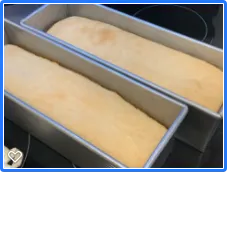I've been making two big 800 gram loaves of multigrain sandwich bread every couple of weeks, for years now. I use 500 grams of home-ground flour and 250 grams of King Arthur bread flour, and water, honey, eggs, etc. It's been simple and consistent for ages. The home-ground grains I use are equal measures of hard red winter wheat, oat groats, spelt, and Kamut.
Recently I got some hard red SPRING wheat and wanted to try it "by itself" instead of with the other home ground grains. So it was 500g hard red spring wheat and 250g of KA. All the other ingredients the same, and I'm sure that's the problem, but I'm not sure where to go!
Every time, the loaves collapse in baking.
I figure it's got to be a hydration issue but I thought I'd ask the hive mind here my first question. Any suggestions?
Thanks!
David in Georgia
Welcome to TFL.
Lessee....
2 loaves of 800 g dough each. 1600 g batch of dough.
750 g flour. Assume 15 g salt. So that means about 1600 - 750 - 15 = 835 water.
Or 111% hydration. Honey and eggs count mostly, but not entirely, as water.
So you still have about 100% hydration.
Both oats and Kamut usually take more water than regular wheat. Maybe your spelt too.
So without any photos to go by (exterior and crumb photos would help) my first guess is that's it's over-hydrated. (You said you kept everything else the same.)
If your new spring wheat is fresher, it likely has more inherent moisture content than your older winter wheat, further increasing overall moisture.
If you live in a dry climate, your wheat berries lose moisture over time, if you store them long enough.
So I've now got a third - or is it fourth? - batch in bulk rise with 450g water. Seeing the "100% hydration" kinda blew me away but of course it's right.
Here's the most recent good batch of multigrain sandwich bread:
I've made that multi-grain bread in the past with as much as 600-650g of water. I guess in retrospect I'm amazed by that in terms of the baker's percentage of water, but it's worked time after time.
Here is one of the recent too-wet only HRSW + KA disasters:
Image

I just wanted to include one of the successful pairs of loaves so you could know that even with that stupid-high hydration number, it has made great bread over and over :)
I'll post what I get from the dryer batch.
Thanks for your time, and sorry for the messy post.
So not surprisingly, reducing hydration fixed the collapse. This was with 450g water. It's an ugly small loaf, so now I have to work up the recipe to make a bigger loaf to fill the loaf pan. I never would have thought that different types of grain would handle water so differently but there you have it. Thanks for the help.
.
Glad to be of service.
I hope you can stick around and share your baking discoveries and adventures with the group.
--
As a side note, you now also have the opportunity to play around with the extra gluten that the hard red spring wheat brings to the dough, replacing the no-gluten oats, and the less-gluten spelt. The Kamut, which I have also ground and baked with (not lately though) has protein, but the gluten is more elastic than extensible.
Things to play/experiment with would be less/no eggs, pre-soak time (prior to adding yeast or levain), mixing/kneading time, etc.
Several bakers here make some mighty fine looking 100% whole wheat loaves, even from home-milled flour. The secret ingredient seems to be a little vital wheat gluten (VWG).
--
Phaz's comment on winter vs spring wheat may be true in some/most cases, I'm not sure, but it very much depends on the varieties involved. HRSW, such as Bronze Chief, mostly has a good reputation for high protein and good bread, so as they say "it all depends."
Thanks. I started some years ago with whole-wheat (only) bread using hard red wheat. I could never get the texture I wanted, though. Ultimately I was aiming for a more commercial mouth feel, I guess, something a little more like Sarah Lee whole wheat bread. After a LOT of different loaves and combinations, I decided I liked the combination I'm using now the best (that and cinnamon-raisin bread, which is a LOT of trouble). In particular I really liked what adding oat groats did to texture. Spelt and Kamut were eventually added because I had them and I liked the result, and I kinda figure the more whole grains I can get, the better it probably is for me.
Re: eggs - I should try without them one of these days. I remember when I was first experimenting that they added something I liked, but it's been so long, frankly I don't remember what it was ;)
What will pre-soak do for me?
Re: HRSW vs HRWW, I've noticed in searching I can find any answer I want, regarding which is higher protein/gluten. I'm satisfied to know they're both high-gluten, and work great.
I do add 4 tbsp VWG to my big two-loaf batches, by the way.
As an aside, I got started with Becker's Home Ground Flour book.
Thanks again!
Spring wheat - gluten not as good as winter. Adjust accordingly. Enjoy!